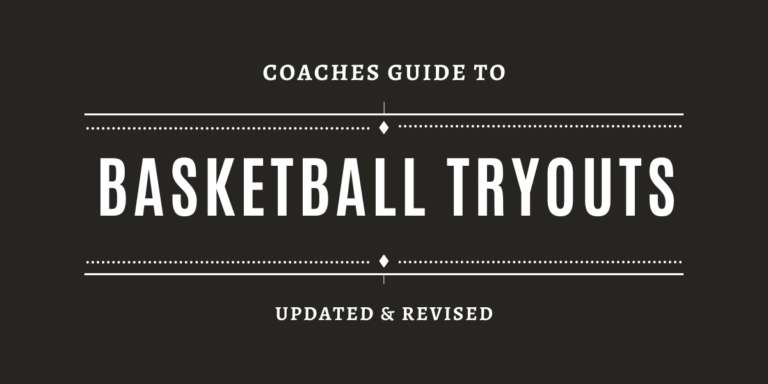7 Habits Of Highly Effective Coaches
I’m sure you’ve heard of the book 7 Habits Of Highly Effective People, by Stephen Covey. Well today, I’m going to give you the 7 Habits of Highly Effective Coaches. While the author (me) isn’t nearly as known I think you’ll get a few good takeaways.
Now, the following habits are not a complete guide to a championship, but I believe they are a complete guide to a successful season. And who knows, a successful season may lead you to a championship. 
One last thing before you get started… it’s important to know that the habits are not listed by importance. Each of the seven habits is critical to becoming a highly effective coach and no one should be looked at as more important than another.
With that said, here we go. Highly effective coaches…
Rule 1: Don’t try to please everyone (because it will never happen)
Know what you stand for and how you want to run your team or program and be confident in what you do and say. This doesn’t mean you should act before you think. It would be more prudent to follow the old adage “think before you act” but once you know who you are as a coach own it. Not everyone will agree with you and that’s okay. We all have our naysayers. Your goal is to get buy-in from your players and staff. The rest of the pundit’s comments need to be taken with a grain of salt at the very most.
Rule 2: Have a strategy they understand and believe in
Highly effective coaches have a strategy for each of the four phases of the game that they truly believe in and understand. They then take this belief and understanding and pass it on to their coaching staff and ultimately to their players. They don’t get caught up in new fads or drills because they look cool. They search out drills and concepts that reinforce the strategies they believe will help their team find the most success.
Rule 3: Aren’t afraid to learn
Being a life long learner is a true blessing if you want to be a highly effective coach. These coaches are always looking for a new approach to teaching the game or searching out a strategy that best fits their team. Take one of the, if the not the greatest high school coaches of all time, Bob Hurley, as an example. He was known for taking notes at every practice he attended. A highly effective coach isn’t afraid to learn, ever.
(One thing I do is choose a topic in the off-season and dive into it with great focus. I try to become an expert in that one area. Many of the resources inside the Coaching Lab are due to my deep dive into a concept or strategy.)
Rule 4. Are organized
I’ve never met a successful coach who wasn’t organized. This doesn’t mean they all have spreadsheets, folders, and labels for everything. It’s more of having a system for getting things done and knowing when and where certain things have to happen in order to find success. I think it’s important to add that they major in the majors and not in the minors as well. People who are organized can sometimes take organization too far and get stuck in the weeds because turn organization into control. A highly effective coach knows how to delegate and pass responsibility off to an assistant or lower level coach because they know they need to focus on the major items of the day, the minor items can be taken care of by someone else.
Rule 5. Keep their emotions in check
Emotions are a bit of a two-edged sword.
- They can light a fire to motivate people… but they can also tear someone down.
- They can bring a team together… but they can also pull a team apart.
- They can help you get a call in a game… but they can also get you a technical foul.
The other thing emotions can do is keep you from focusing on what needs to be done next. If a coach is so mad about the last call that they use a timeout to scream at the refs they miss the opportunity to get their team focused on what needs to be done when the team steps back on the court. Be sure to keep your emotions in check to give your team the best chance to make the next right move and find success.
Rule 6. Surround themselves with trusted advisors
Surrounding yourself with advisors you trust is imperative on your coaching staff but it doesn’t stop there. You also need someone who is outside of your team to bounce ideas off of. This could be a mentor, a retired coach, or someone who will be honest with you even when they know you don’t want to hear something. The reason I call these people advisors and not coaches are because an advisor is someone you want feedback from. When you ask your JV or assistant coach what they are seeing at half-time of a game they should be giving you an honest assessment. They aren’t the JV or assistant coach at that time, they are an advisor who is advising you on a change that should be made or a pattern they are noticing in the game. A mentor may not know everything about every player on your team but they can spot inadequacies you may be overlooking when it comes to overall strategy or dealing with a player or parent.
Rule 7. Communicate effectively with their stakeholders
There are several groups of people who fall under stakeholders: administrators, parents, players, game workers, referees, and coaches. These are the people who need to be in the know when it comes to having a successful season. Not every group needs to know the same thing as another group, but they all need to be communicated with, in an effective and timely manner. Here are a couple of examples:
Parents:
- need to know the ground rules of your program
- need to know the expectations of their player in the program
- want to be informed of schedule changes as soon as possible
Athletic Director:
- should be notified of any issue or problem that comes up
- should be kept in the loop about parent meetings
- need to be a part of the conversation when it comes to schedule changes
Players:
- need to be communicated with about their role
- need to know their strengths and weaknesses as a player
- need to understand the process for setting up a meeting (if there is one)
- learn the two things your communication needs when coaching your players
Communication is key to being a successful coach and is vital to any good relationship. In my experience, most coaches who have issues with stakeholders typically boil down to a lack of communication. (Here is one strategy I use to help frame parent and player communication.)
The most difficult part of being a highly effective coach is knowing when you lack in one or more habits. There have been times when I look back and say, “I handled that wrong and I wish I could have a do over.” There is nothing wrong with having humility and being a big enough person to admit you make mistakes too. You don’t have to be perfect all of the time, you just need to be aware of the times you weren’t perfect so you don’t repeat the same mistake.
In closing, if I could add one additional habit to this list it would be – highly effective coaches have the ability to reflect.







